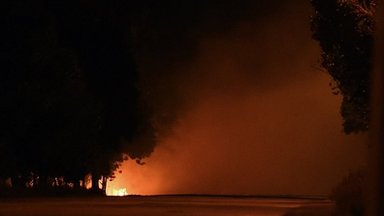
Shelling near Ukraine’s south-eastern city of Mariupol has threatened a fragile ceasefire between government forces and pro-Russian rebels. A BBC correspondent there says intense blasts from the eastern edges rippled across the city late on Saturday. The fighting subsided in the early hours. Mariupol is seen by the rebels as a key city on the route to Crimea. On Saturday, the Ukrainian and Russian presidents said the ceasefire in eastern Ukraine was “largely holding”. It was signed during talks between representatives of Ukraine, Russia, the Organization for Security and Co-operation in Europe (OSCE) and pro-Russia rebels in Belarus and came into effect on Friday. There were no reports of major fighting in the east for the first 24 hours, but by Saturday evening the BBC’s Fergal Keane tweeted from Mariupol that shelling had resumed. A government checkpoint on the eastern approaches to the city was reportedly destroyed. Analysis: BBC’s Richard Galpin in Donetsk Eyewitnesses say pro-Russian rebels shelled an important government checkpoint on the eastern approaches to Mariupol. Ukrainian forces returned fire but the checkpoint was destroyed. Fires were seen within the city limits as Ukrainian volunteer fighters rushed to the frontlines. The shelling could be heard into the early hours of the morning. But now the area is once again quiet. This was clearly a serious breach of what was already a fragile ceasefire. Mariupol is a vital port city on the coast of the Azov Sea. It also lies on a major highway leading to Crimea, which was annexed by Russia earlier this year. It is one of the most important cities in south-eastern Ukraine which remains in government hands. A rebel leader said receIn another development, a new report by Amnesty International accuses all sides in the conflict of committing war crimes. The human rights group said civilians had accused Ukrainian government troops of shelling their neighbourhoods indiscriminately. Witnesses also said that separatist fighters had “abducted, tortured, and killed their neighbours”. The report accused Russia of fuelling separatist crimes. Aid blocked Some 2,600 people have died in fighting after pro-Russian rebels seized towns in Ukraine’s eastern Donetsk and Luhansk regions in April – a month after Russia’s annexation of the southern Crimean peninsula. Russia has repeatedly denied accusations by Ukraine and the West that it has been sending regular troops into eastern Ukraine to help the rebels. Ukraine’s President Petro Poroshenko and his Russian counterpart Vladimir Putin spoke by phone on Saturday to discuss steps to make Friday’s truce durable. In a statement Mr Poroshenko said they had stressed the need “to maximise the involvement” of the OSCE in monitoring the truce. The two leaders also discussed ways of co-operating in delivering humanitarian aid to the region. For his part, President Putin said in a statement that an agreement was reached to “continue dialogue”. The OSCE has published on its website, in Russian only, the 12-point roadmap for Ukraine that led to Friday’s agreement of the truce. It sets out a decentralisation of power and the prospect of special status for the Donetsk and Luhansk regions, as well as the withdrawal of “illegal military formations” from Ukraine and provisions for an amnesty. Sanctions The rebel leader of the self-proclaimed Donetsk People’s Republic, Aleksandr Zakharchenko, said the truce was “not being fully observed” and that rebels had been subjected to shelling in the town of Amvrosiyivka near Donetsk on Saturday. Unconfirmed reports also say a number of fighters from Ukraine’s Aydar battalion were ambushed and killed after the ceasefire. Also, the International Committee of the Red Cross (ICRC) said in a tweet that aid trucks on their way to Luhansk had been forced to turn back by shelling, without giving any further details. Meanwhile, Russia vowed to respond if the European Union imposed new sanctions over the Ukraine crisis. The EU says the sanctions, targeting more Russian individuals, will be introduced on Monday but could be suspended if Russia withdraws troops from eastern Ukraine and observes the truce. The Russian foreign ministry said the EU was “practically sending a signal of direct support to the ‘party of war’ in Kiev”. Source : BBC Online

